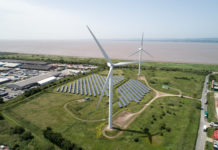
Energy Minister Matthew Hancock has dismissed accusations from renewable lobby groups that auctions run as part of the government’s electricity market reform (EMR) favoured big companies over independent generators.
He also rejected claims that the recent capacity auction simply rewarded plant that would have been available without bill-payer incentives.
Facing Energy and Climate Change Committee scrutiny on EMR this week, Hancock was grilled by MPs about both the recent capacity auction and the forthcoming allocation of contracts for difference (CfDs).
The former auction is designed to reward generators for making plant available when it is needed and bring forward investment in new plant. The latter is designed to subsidise low carbon generation.
The first capacity auction (so-called T-4 because it secures capacity to be supplied in four year’s time) took place just before Christmas. It procured 49.26GW of capacity at a clearing price of £19.40kW. Most of that power will be provided by existing gas and coal plant, more than 2GW of new gas plant has contracted to supply power, and Decc was happy with the result.
However, the department has subsequently faced accusations that it has largely rewarded existing coal, gas and nuclear plant.
Old king coal
Sir Robert Smith, the Lib Dem MP for West Aberdeenshire and Kincardine, asked Hancock whether he agreed with that assessment, made by Carbon Brief (funded by the European Climate Foundation lobby group).
“No,” said Hancock. “I think the auction has been fair across technologies and we have a good balance of existing capacity that we want to remain on the system. Refurbished plant is one of the best values for money, and some new generation as well.”
Surely “some of the existing stuff would have stayed there anyway?” asked Smith.
“I fully expected that whatever the outcome of the auction there would have been some people complaining that it was the wrong one,” Hancock replied. “According to that critique, that is what has happened.”
“If there had been much more new capacity, those with existing capacity would have said ‘we have to keep our capacity open’,” Hancock continued. “If there had been no new capacity, people have said ‘this was supposed to get some new capacity onto the blocks.’ It’s about a balance and there will always be winners and losers.”
Big boys club?
Similarly, Hancock dismissed claims by renewables groups that their members had been “smothered out” by a process designed to favour big business, and that technologies such as solar PV had been overlooked.
Graham Stringer, Labour MP for Blackley and Broughton, brought up evidence to that effect submitted by the Solar Trade Association’s external affairs chief Leonie Green.
Hancock suggested trade associations “would be failing in their duty” had they not “pushed for the design to be slightly more favourable to their particular technology… so of course there were proposals that we didn’t take up because we wanted it to be as fair as possible.” Hancock added he “would have been amazed if that wasn’t the case,” but denied he was suggesting all criticisms were self-interested.
John Robertson, Labour MP for Glasgow West then asked how Decc had helped smaller participants compete equally for CfDs. Hancock replied that the “proof of the pudding” would be determined after the inaugural auction (scheduled for April).
Robertson quoted criticisms by the STA’s Green that sinking £200,000 into prequalification criteria for the CFDs created a disproportionate risk for smaller firms. He also noted comments from Renewable Energy Association chief Nina Skurupska that the CFD framework is geared toward companies that understand the market mechanisms, “less so for those that want to enter the market.”
Giving evidence to the committee earlier that day, National Grid head of regulation Mark Ripley had suggested that those wishing to participate in the generation market should at least have a grasp of its workings.
Hancock, though, said the critical factor was affordability and certainty. He replied to Robertson that as small business minister he “bowed to no one” in trying to help small firms compete. However, “if we are signing up bill payers to multimillion or billion pound contracts, we have to have a reasonable certainty that the businesses on the other side can deliver.”
Hancock suggested small businesses opt for the Feed in Tariff (FiTs) scheme as the cost of entry is much lower. “So this [the CfD] is designed for the big stuff. [The feed-in tariff] is a much simpler and cheaper to apply for system for the smaller stuff.” He admitted that “very small suppliers will find it very difficult to get through the same process [compared to] multi-billion pound power stations… but I make no excuses for dealing cautiously with money that consumers pay on their bills.”
Renewable groups had also suggested holding more frequent auctions than the current annual allocation of contracts. Hancock accepted that debate as “perfectly reasonable” but said the department was “not looking at more than annual auctions”.
Watch the session here.
Related articles:
UK businesses pan electricity market reforms, prepare for 10% power price hikes in 2015
Another fine mess: Energy policy’s perverse outcomes mean ‘new Energy Act by 2017′
Click here to see if you qualify for a free subscription to the print magazine, or to renew.
Follow us at @EnergystMedia. For regular bulletins, sign up for the free newsletter.




[…] here for an interesting article on The Energyst about the recent appearance of Matthew Hancock (Energy […]